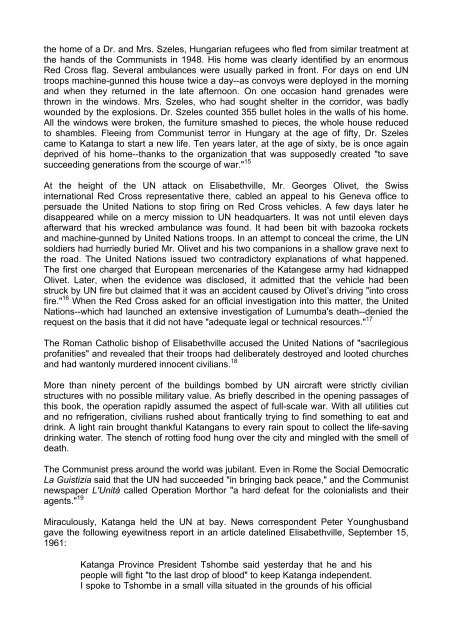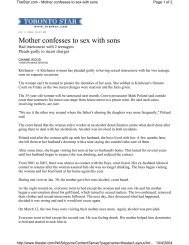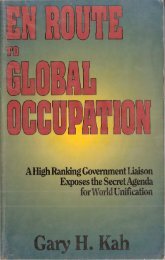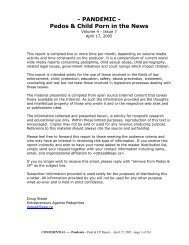G. Edward Griffin - The Fearful Master - PDF Archive
G. Edward Griffin - The Fearful Master - PDF Archive
G. Edward Griffin - The Fearful Master - PDF Archive
You also want an ePaper? Increase the reach of your titles
YUMPU automatically turns print PDFs into web optimized ePapers that Google loves.
the home of a Dr. and Mrs. Szeles, Hungarian refugees who fled from similar treatment at<br />
the hands of the Communists in 1948. His home was clearly identified by an enormous<br />
Red Cross flag. Several ambulances were usually parked in front. For days on end UN<br />
troops machine-gunned this house twice a day--as convoys were deployed in the morning<br />
and when they returned in the late afternoon. On one occasion hand grenades were<br />
thrown in the windows. Mrs. Szeles, who had sought shelter in the corridor, was badly<br />
wounded by the explosions. Dr. Szeles counted 355 bullet holes in the walls of his home.<br />
All the windows were broken, the furniture smashed to pieces, the whole house reduced<br />
to shambles. Fleeing from Communist terror in Hungary at the age of fifty, Dr. Szeles<br />
came to Katanga to start a new life. Ten years later, at the age of sixty, be is once again<br />
deprived of his home--thanks to the organization that was supposedly created "to save<br />
succeeding generations from the scourge of war." 15<br />
At the height of the UN attack on Elisabethville, Mr. Georges Olivet, the Swiss<br />
international Red Cross representative there, cabled an appeal to his Geneva office to<br />
persuade the United Nations to stop firing on Red Cross vehicles. A few days later he<br />
disappeared while on a mercy mission to UN headquarters. It was not until eleven days<br />
afterward that his wrecked ambulance was found. It had been bit with bazooka rockets<br />
and machine-gunned by United Nations troops. In an attempt to conceal the crime, the UN<br />
soldiers had hurriedly buried Mr. Olivet and his two companions in a shallow grave next to<br />
the road. <strong>The</strong> United Nations issued two contradictory explanations of what happened.<br />
<strong>The</strong> first one charged that European mercenaries of the Katangese army had kidnapped<br />
Olivet. Later, when the evidence was disclosed, it admitted that the vehicle had been<br />
struck by UN fire but claimed that it was an accident caused by Olivet’s driving "into cross<br />
fire." 16 When the Red Cross asked for an official investigation into this matter, the United<br />
Nations--which had launched an extensive investigation of Lumumba's death--denied the<br />
request on the basis that it did not have "adequate legal or technical resources." 17<br />
<strong>The</strong> Roman Catholic bishop of Elisabethville accused the United Nations of "sacrilegious<br />
profanities" and revealed that their troops had deliberately destroyed and looted churches<br />
and had wantonly murdered innocent civilians. 18<br />
More than ninety percent of the buildings bombed by UN aircraft were strictly civilian<br />
structures with no possible military value. As briefly described in the opening passages of<br />
this book, the operation rapidly assumed the aspect of full-scale war. With all utilities cut<br />
and no refrigeration, civilians rushed about frantically trying to find something to eat and<br />
drink. A light rain brought thankful Katangans to every rain spout to collect the life-saving<br />
drinking water. <strong>The</strong> stench of rotting food hung over the city and mingled with the smell of<br />
death.<br />
<strong>The</strong> Communist press around the world was jubilant. Even in Rome the Social Democratic<br />
La Guistizia said that the UN had succeeded "in bringing back peace," and the Communist<br />
newspaper L'Unità called Operation Morthor "a hard defeat for the colonialists and their<br />
agents." 19<br />
Miraculously, Katanga held the UN at bay. News correspondent Peter Younghusband<br />
gave the following eyewitness report in an article datelined Elisabethville, September 15,<br />
1961:<br />
Katanga Province President Tshombe said yesterday that he and his<br />
people will fight "to the last drop of blood" to keep Katanga independent.<br />
I spoke to Tshombe in a small villa situated in the grounds of his official



![Robert T McQuaid [rtmq@stn.net] Sent: Friday, October 29, 2004 12 ...](https://img.yumpu.com/51070071/1/190x245/robert-t-mcquaid-rtmqstnnet-sent-friday-october-29-2004-12-.jpg?quality=85)







